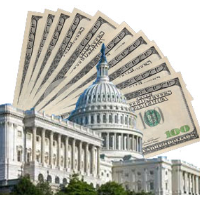Why Do most Americans Feel Politically Powerless?...Because They Are
 (graphic: Steve Straehley, AllGov)
(graphic: Steve Straehley, AllGov)
The Supreme Court’s Citizens United decision gave the wealthy almost unlimited means to influence elections at the expense of the average voter. But the voices of rich individuals and corporations had long drowned out the concerns of most Americans, according to a new study.
In their work “Testing Theories of American Politics: Elites, Interest Groups, and Average Citizens,” Martin Gilens and Benjamin I. Page argue that ordinary Americans have almost no influence on policy. “Not only do ordinary citizens not have uniquely substantial power over policy decisions; they have little or no independent influence on policy at all,” according to the study, due to be released this fall.
Who does affect policy? As might be guessed, it’s the wealthy and powerful interest groups. “Economic elites are estimated to have a quite substantial, highly significant, independent impact on policy.” According to the study, that group is the most influential in terms of getting what it wants out of elected officials. Organized interest groups are also influential.
The data leading to these conclusions was gathered from 1,779 policy cases between 1981 to 2002, so anecdotal evidence would lead one to believe the problem is actually now worse than represented by the study.
Former Labor Secretary Robert Reich writes that part of the reason for the decline of influence of the average voter has come because of changes that have come since about 1980. Before then, many Americans were represented by unions and were members of civic and other organizations. Then, “something profoundly changed,” Reich wrote. “Grass-roots membership organizations shrank because Americans had less time for them. As wages stagnated, most people had to devote more time to work in order to makes ends meet. That included the time of wives and mothers who began streaming into the paid workforce to prop up family incomes.”
As this was going on, union membership began to fall, spurred by President Ronald Reagan’s firing of striking air traffic controllers. In addition, community businesses which often had the ear of local politicians began to give way to national chains that had less concern for the rank-and-file worker than the bottom line.
Another factor, as explained by political scientists Jacob S. Hacker and Paul Pierson in Winner-Take-All Politics: How Washington Made the Rich Richer--and Turned Its Back on the Middle Class, is that, beginning in the mid-1970s, large corporations began organizing into well-funded lobbying groups like the Business Roundtable and the U.S. Chamber of Commerce. These groups, which had leaned Republican, realized that it would be more effective to influence members of Congress from both parties.
Part of the blame should be shouldered by the electorate, or rather, what there is of it. Voter turnout historically is highest among the well-off and falls as the income of the population does. According to statistics compiled by the U.S. Census Bureau, 67.1% of members of families with annual incomes higher than $150,000 a year reported being registered to vote in 2012. That percentage drops with each income group down to 59.5% for families with incomes between $10,000 and $14,999.
“We have to establish a new countervailing power,” Reich wrote. “The monied interests are doing what they do best – making money. The rest of us need to do what we can do best – use our voices, our vigor, and our votes.”
-Steve Straehley, David Wallechinsky
To Learn More:
Who Rules America? (by Allan J. Lichtman, The Hill)
The Disease of American Democracy (by Robert Reich)
Testing Theories of American Politics: Elites, Interest Groups, and Average Citizens (by Martin Gilens and Benjamin I. Page) (pdf)
Democracy and the Policy Preferences of Wealthy Americans (by Benjamin I. Page, Larry M. Bartels, and Jason Seawright) (pdf)
Super Rich Have Different Government Spending Priorities…and More Influence (by David Wallechinsky, AllGov)
- Top Stories
- Unusual News
- Where is the Money Going?
- Controversies
- U.S. and the World
- Appointments and Resignations
- Latest News
- What If China Invaded the United States?
- Donald Trump Has a Mental Health Problem and It Has a Name
- Trump Goes on Renaming Frenzy
- Trump Deports JD Vance and His Wife
- Trump Offers to Return Alaska to Russia






Comments